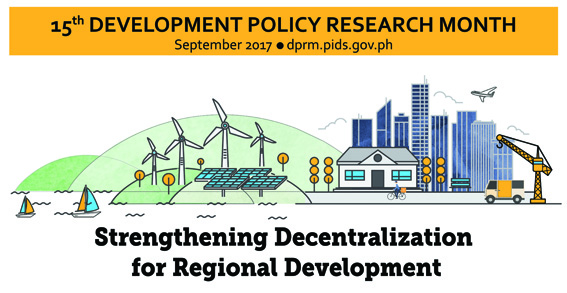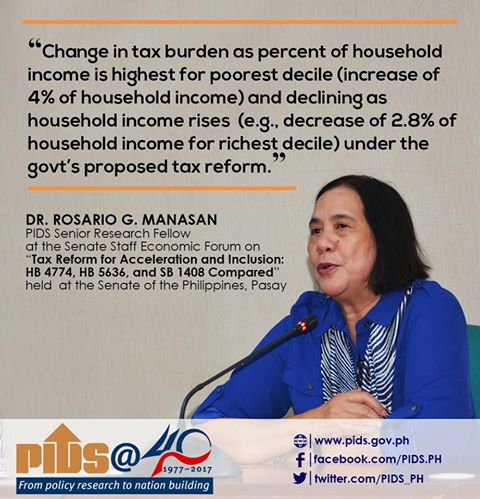|
|
MONDAY / 04 SEPTEMBER 2017

|
IN FOCUS: Decentralization Reforms

The Philippines has
a long tradition of centralized governance. Since the Spanish period,
Manila has served as the seat of economic and political power, which
some claim became the main driver of the uneven development in the
country today. Through the passage of the Local Government Code (LGC)
in 1991, certain powers were devolved to local governments, which gave
them political, administrative, and fiscal autonomy.
However, the impacts of
decentralization have been mixed. Inequality in the country has
remained high relative to its East Asian neighbors, and the poverty
profile has barely changed over the past two decades. Poverty has
remained highly concentrated in the rural areas, particularly in
Mindanao. Effective decentralization has not been realized, analysts
noted, because devolved functions were not complemented by adequate
revenue-raising powers, clear division of responsibilities, and
bureaucratic capacity building. Thus, local governments continued to
face various challenges in the exercise of their devolved service
delivery functions.
The expenditure
assignment and spending distribution play a crucial part in it,
according to Philippine Institute for Development Studies (PIDS)
fiscal policy expert and Senior Research Fellow Rosario Manasan. The
national government transferred many of its unfunded mandates to local
government units (LGUs) leaving the latter unequipped with the
necessary appropriations to carry out their additional
responsibilities. As a result, some LGUs are struggling to sustainably
finance their basic services, such as health and education, according
to PIDS researchers Allan Layug, Ida Pantig, Leilani Bolong, and
Rouselle Lavado. Uma Keleker and Gilberto Llanto, PIDS consultant and
president, respectively, also discovered in their study that many LGUs
are not even capable of providing the mandated benefits for their
health workers under the Magna Carta for Public Health Workers.
Productive sources of
revenues could have helped the LGUs finance their basic services.
However, the LGC itself contributes to the low tax performance of LGUs,
as it fails to empower them with greater discretion in raising the
maximum allowable tax rates, according to Manasan. Llanto, in another
study, claimed this limitation significantly reduces local fiscal
autonomy and forces the LGUs to remain excessively dependent on the
internal revenue allotment to meet local budgetary needs.
The failure of the
government to prioritize capacity building also obstructs the country’s
goal to fully decentralize. In the basic education sector, alone, the Philippine Human Development Report 2008/2009 criticized
the institutional culture in the Department of Education (DepEd),
wherein lower offices rely on explicit instructions from higher office
before making decisions. The study tagged this top-bottom management
process as antithetical to the core values of decentralization. It urged
the DepEd to redefine the role of its central office, and empower and
capacitate its staff to be effective despite the limited resources at
their command.
The National Economic and Development Authority, in its Philippine Development Plan 2011-2016,
also noted the “confused and overlapping performance of functions” as a
factor behind the country’s failure to decentralize. In terms of
infrastructure, for instance, an article in the Philippine Journal of Development
published by PIDS found that the Department of Public Works and
Highways and other national agencies are still involved in the
construction of local roads, although with less budget and authority.
In terms of administration, Keleker and Llanto found that LGUs are
still complying with the guidelines of the Department of Budget and
Management on their employees’ salary, despite the autonomy the LGC has
granted them on this ground.
It is for these reasons
that PIDS dedicated the celebration of the 15th Development Policy
Research Month to the issue of decentralization reforms. With the theme
“Strengthening Decentralization for Regional Development”, the
Institute aims to highlight the need for in-depth reflections and evidence-based
analyses of decentralization reforms in the country, including the
shift to a federal form of government. For details on the 15th DPRM, go to https://dprm.pids.gov.ph/.
Know what other PIDS studies have to say about decentralization. Visit the Socioeconomic Research Portal for the Philippines. Simply type “decentralization”, “federalism”, and other related keywords in the search box.
|
September 5, 2017, 11-1PM
Press Conference on the 2017 DPRM (Theme: Strengthening Decentralization for Regional Development)
Venue: Philippine Information Agency, Quezon City
September 7, 2017, 9-5PM
Third Mindanao Policy Research Forum on Federalism as Policy Option for a Decentralized Inclusive Development
Venue: Ateneo De Zamboanga University, Zamboanga City
September 7, 2017, 12-1PM
Regional Press Conference on the 15th Development Policy Research Month (DPRM) Celebration
Venue: Ateneo De Zamboanga University, Zamboanga City
September 19, 2017, 9-5PM
Third Annual Public Policy Conference on Critical Perspectives on Federalism for Regional Development
Venue: Marco Polo Ortigas,
Pasig City
September 21, 2017, 9-5PM
PIDS-ERIA Public Symposium on Economic Integration and Nation Building
Venue: Marco Polo Ortigas,
Pasig City
October 18, 2017, 9-5PM
PIDS-ANU Forum on Regulation and Governance in the Philippines: Development Policy Challenges for the New Administration
Venue: Marco Polo Ortigas,
Pasig City
.jpg)
The Philippine Journal of Development
is a professional journal published by the Philippine Institute for
Development Studies. It accepts papers that examine key issues in
development and have strong relevance to policy development. As a
multidisciplinary social science journal, it accepts papers in the
fields of economics, political science, public administration,
sociology, and other related disciplines. It considers papers that have
strong policy implications on national or international concerns,
particularly development issues in the Asia-Pacific region.
CLICK HERE for the guidelines in the preparation of articles. Submissions and inquiries may be sent to PJD@mail.pids.gov.ph
|
|
|
POLICY NOTE
PN 2017-16: Preventing Childhood Stunting: Why and How?
by Alejandro N. Herrin
According
to the Food and Nutrition Research Institute, childhood stunting
affects one-third of under-five Filipino children annually.
Unfortunately, the Philippines has shown little progress in reducing its
prevalence in the last 20 years. This Policy Note analyzes
the factors contributing to child stunting in the country and finds
that mothers' nutrition and health status during pregnancy remain
crucial aspects that can influence birth outcomes. It asserts the need
to adopt a nutrition agenda focused on stunting prevention and the
effective delivery and financing of cost-effective interventions. It
also urges the Philippine government to take advantage of the existing
opportunities offered by the increasing global interest in child
stunting and the platforms for the identification of the poor and the
delivery and financing of health services. Click here for the full article.
DISCUSSION PAPERS
- DP 2017-27: Assessment of the 2017 Tax Reform for Acceleration and Inclusion
by Rosario G. Manasan
Despite
various reform efforts over the years, the Philippine tax system
continues to suffer from chronic weaknesses. The Duterte administration
is pursuing a simpler, more efficient, and more equitable system to
support its economic growth strategy. The administration's
Comprehensive Tax Reform Program (filed as House Bill No. 4774 and
Senate Bill No. 1408) and Tax Reform for Acceleration and Inclusion
(House Bill No. 5636) seek structural reform on personal income tax,
value-added tax, and excise tax on petroleum products and automobiles,
while improving the progressivity of the tax system. A portion of the
additional revenues generated will be earmarked for investments in
education, infrastructure, and health to stimulate long-term growth.
Look into the implications of these bills on the distribution of tax
burden across income groups, economic incentives in affected sectors,
national government revenues, as well as likely impact on tax
compliance in this paper. Click here for the full paper.
- DP 2017-26: Evaluation of Fiscal Incentives in the Philippines
by Danileen Kristel C. Parel
The
advantages of foreign direct investment to host countries,
particularly on economic growth, have long been recognized. The amount
of investment that enters a country is influenced by various factors,
including tax rates and the provision of fiscal incentives. This paper
(1) assesses how the Philippines fares in attracting investments
compared with its neighboring countries and (2) evaluates pending
incentive reforms in the country. As the corporate income tax does not
take into account other tax rules, effective tax rates, which provide a
single measure reflecting the combined effect of all tax rates and
incentives, were computed and used in the assessment.
Click here for the full paper.
|

|
 Gov’t should approve new tax measure as package to be effective – PIDS research fellow Gov’t should approve new tax measure as package to be effective – PIDS research fellow
It is important to pass the new tax
reform bill of the government as a package, according to a senior
research fellow of the Philippine Institute for Development Studies.
This is not to say, however, that some of the components of the package
should not be reviewed further.
Dr. Rosario Manasan, an expert in public
finance, explained that approving and implementing the TRAIN (Tax
Reform for Acceleration and Inclusion) in a package increases the
likelihood that it will bring in more revenues for the government.
The TRAIN bill is part of the Department
of Finance’s Comprehensive Tax Reform Program that recommends the
lowering of personal income tax but increasing excise taxes on fuel, new
cars, and sugar products to offset possible losses. READ MORE
|
 Childhood stunting in PH is prevalent – PIDS study Childhood stunting in PH is prevalent – PIDS study
One in every two children under five years
of age suffer from stunting, or those whose height is short for their
age, reveals a study of state think tank Philippine Institute for
Development Studies (PIDS).
PIDS consultant Alejandro Herrin in a policy
note titled “Preventing Childhood Stunting: Why and How?” disclosed that
the Philippines has shown little progress in reducing the prevalence of
childhood stunting in the last 20 years, despite its lasting
consequences on one’s health, learning, and economic productivity. READ MORE |

Need help? Have feedback? Feel free to contact us.
If you do not want to receive PIDS Updates, click here.
© 2017 Philippine Institute for Development Studies.

 
|
|


.jpg)
 Gov’t should approve new tax measure as package to be effective – PIDS research fellow
Gov’t should approve new tax measure as package to be effective – PIDS research fellow Childhood stunting in PH is prevalent – PIDS study
Childhood stunting in PH is prevalent – PIDS study
